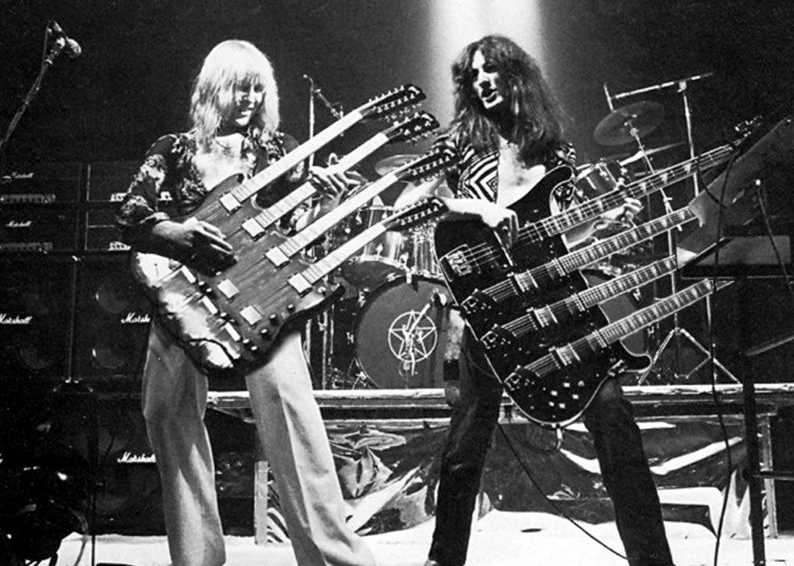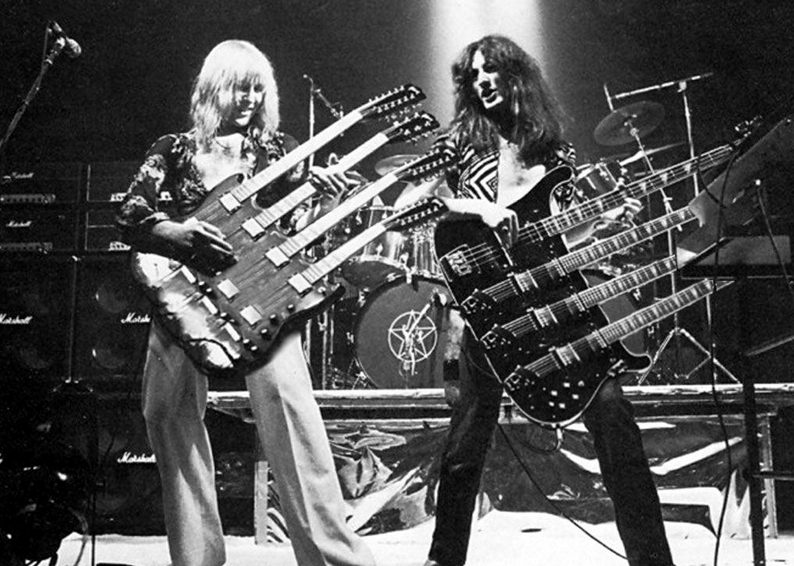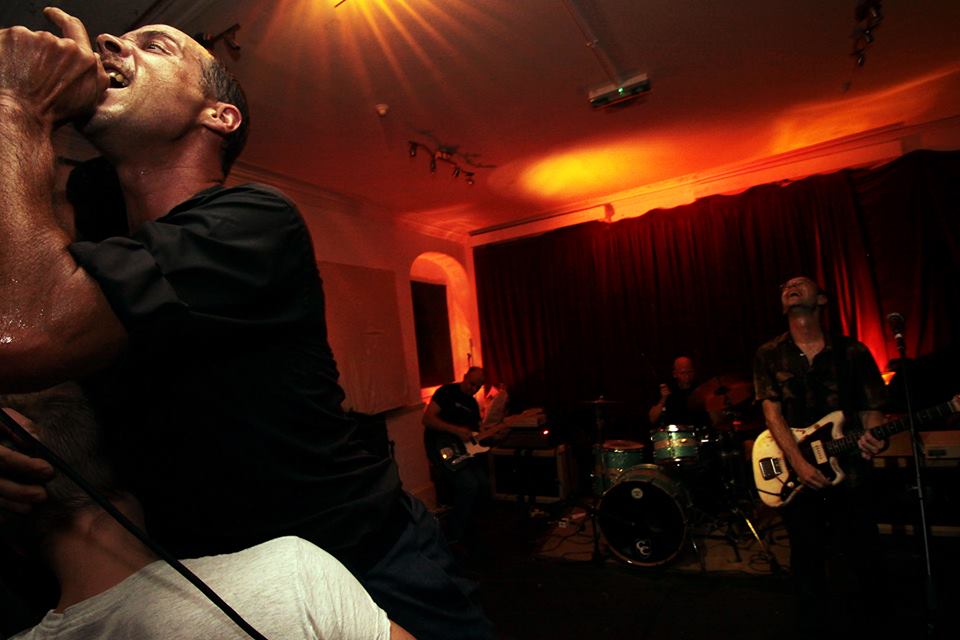There’s a certain school of thought that declares punk rock as the saviour of music, wiping away an era of awful, bloated sounds. It was essentially the ‘Second Coming’ of good music, without needing a ‘First Coming’ to justify that title. “NO FUTURE!” screamed the punks, but what they really meant was “NO PAST”, and over the years, as the music press has become populated by the disciples of punk, this has become accepted as fact. And of all the victims of this cull, none fell further than progressive rock.
With the way people listen to music having irreparably changed, notions of ‘cool’ and ‘relevance’ have lost a lot of their meaning. Indeed, the ‘shame’ that used to come with purchasing certain kinds of music has become a thing of the past, with most people having access to an online virtual record collection that they can access in the safety of their own home, without having to confront the watchful eye of the record store clerk. It were different in my day, that’s for sure, but it’s now fairly easy to imagine stalwarts of musical integrity like Ian MacKaye chillaxing in the Dischord House, listening to Britney Spears or Miley Cyrus. Indeed, it’s just as easy to picture Britney Spears or Miley Cyrus hitting the gym to a soundtrack of Minor Threat or Fugazi.
So, to a degree, the rigid orthodoxy that sprung up in the wake of punk rock has largely become a thing of the past. However, the one genre that still seems incapable of coming in from the cold is prog rock, the whipping boy of the music press for almost four decades. Online music libraries allow us access to a riches undreamed of in the 80s and 90s, and whilst we can clearly see the influence of things like afro-beat and glam and pop upon the indie-rock hopefuls of today, musicians able to cherry-pick the bits they like, it’s much harder to pick out a young band who’ve used Genesis as the template for their route to musical success.
But what exactly is the problem with this most maligned corner of musical history? What did prog rock do that is so bad that even now, admitting a love for Yes would be akin to saying that you love stealing baby kittens and putting them in a grinder?
To a large degree, prog rock was a victim of its own ambition. Emerging out of the ashes of the 1960s, a handful of bands – largely inspired by The Beatles – saw what was happening in rock music, and felt they could take it further. Records like Sgt Pepper’s Lonely Hearts Club Band and Abbey Road displayed an ambition and scope that was miles ahead of anything and it was only a matter of time before a few enterprising souls felt they could take it to the next level. With obvious ties to the psychedelic movement, Pink Floyd began to emerge from the shadow of their doomed, tragic frontman, Syd Barrett, and by 1970 were crafting serious, lengthy epics like Atom Heart Mother, the band’s first number one album. Matching a symphonic grandeur to their art rock explorations, the band who once sang ‘Set the Controls for the Heart of the Sun’ seemed to be taking their own advice at face value.
King Crimson (pictured) were another bunch of well-educated young men who took rock into truly uncharted waters. Their debut album, In the Court of the Crimson King, featured an epic bombast marked by the aggressively intellectual guitar work of Robert Fripp. In a similar vein, the Peter Gabriel led Genesis explored a strain of quintessentially English whimsy, frequently spilling into the world of grotesque, Victorian horror. ‘The Music Box’, from 1971’s Nursery Cryme told the nightmarish tale of a girl playing croquet with human heads. And just for good measure, there’s a ghost involved.
Along with bands like Yes, Emerson, Lake, and Palmer, and Rush, these artists ploughed their own furrow, dominating the charts, and conquering America with their overblown, grandiose records and lush album sleeves. But this ambition gave way to virtuosity and pomposity, concepts stretching longer and longer, solos pushing the songs out of the way, and as time went on, prog rock became perceived as the domain of teenage boys, a signpost for faux-intellectualism, and one of the least sexy musical genres of all time.
In a realistic sense, prog needed punk as much as punk needed prog. In the aftermath of punk rock’s Stalinist cull, prog re-grouped, streamlining itself, and adapting to the needs of a new decade. Genesis lost Peter Gabriel, moved Phil Collins out from the drum kit to the vocals, and went supernova, known for their arty pop music, and clever videos. Yes scored a monster-hit with ‘Owner of a Lonely Heart’, a dynamic and modern sounding piece of 1980s rock music. King Crimson went underground and re-emerged as part of the New York art-rock scene, making records that sounded like Talking Heads with a PhD. Rush never stopped being Rush, and continued their slow climb to being one of the world’s most beloved cult bands. Emerson, Lake, and Palmer made a shitty disco influenced record, and spent the next twenty years reforming and breaking up, much to the disinterest of the world at large.
But even these 80s re-inventions helped cement the fate of prog as something not to be trifled with, like Satanism or public masturbation. As the 90s dawned, the coffin was nailed shut on prog, with grunge spitting in the face of cape-wearing keyboard virtuosos, or shoulder pad wearing 80s rock dudes. Seemingly for all eternity, this once successful musical world was deemed nerdish, nebbish, and obsolete.
But as we open the doors and banish ‘taste’ into the nether regions of the internet, why are we still afraid to stand up and declare our love for prog rock? After all, many of today’s most pioneering bands have overt references to progressive rock’s mighty lineage, with the Flaming Lips being a prog band in all but name, Fleet Foxes having essentially co-opted the vocal majesty of Genesis and Yes, and Radiohead are still doing their best to avoid their metamorphosis into the 21stcentury Pink Floyd. To be honest, even Mumford and Sons looked like they’d nicked their wardrobe off Jethro Tull’s Ian Anderson, circa 1977.
If prog rock really is the last taboo, can we expect it to be the next musical genre from the past to be plundered by the hitmakers of tomorrow? Probably not, but maybe that terminal uncoolness is what keeps so many people devoted to it. These days, with bands like Marillion, Anathema, and Porcupine Tree updating the sounds and ideas of prog rock and taking it to a new generation, the genre seems to have been granted a new lease of life. After all, at its honourable core, all prog ever wanted to do was to make music that rocked, and was smart at the same time. And as culture dumbs down all around us, prog rock increasingly seems like a bastion of intellectual integrity in a sea of foolishness, albeit a delightfully uncool one.
Here’s some top picks to help you on your journey into the unknown.
1. King Crimson – Epitaph
From the debut album, Robert Fripp and co let everyone know they mean business. The eerie swell of the mellotron (perhaps the quintessentially prog rock instrument) gives the song an apocalyptic edge, whilst the propulsive drumming of Michael Giles takes it into another dimension.
2. Genesis – Back in NYC
1974’s The Lamb Lies Down on Broadway might be their masterpiece, a sprawling double album charting the story of Rael, a Puerto Rican street kid who gets transported into a nightmarish underworld that lies beneath New York whilst looking for his missing brother. This track is one of the highlights, an incredible showcase of dynamics and melodic power.
3. Yes – Roundabout
Yes were always the most whimsical of the prog bands, lapsing into a vaguely defined spirituality without any warning. But this disguised a startlingly taut instrumental ability that allowed them to give some of the most robust and energetic playing of the decade, even if it wasn’t always quite clear what they were going on about. ‘Roundabout’ acts almost as a showcase for what they can do, particularly bassist Chris Squire, who reinvents the bass guitar, turning into a stabbing and jagged lead instrument that still dazzles after all these years.
4. Pink Floyd – Echoes
Dark Side of the Moon is still the biggie, a staggering monolith in the landscape of popular music, but on the preceding album, Meddle, Pink Floyd crafted an epic masterpiece that beguiles and delights as it takes you on a journey from the highest hilltop to the deepest ocean.
5. Rush – Red Barchetta
After unleashing mighty sci-fi epics in the mid-70s, by 1981, Rush had settled down (for a bit) into a sophisticated rock band format, still capable of delivering dazzling instrumental pyrotechnics, but always focused on the song. Moving Pictures is a peach of an album, containing this ode to the delights of speed in a future, totalitarian society. Motor crime never sounded so good.







